|
|
|
Sort Order |
|
|
|
Items / Page
|
|
|
|
|
|
|
| Srl | Item |
| 1 |
ID:
167695
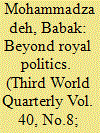

|
|
|
|
|
| Summary/Abstract |
Saudi politics is commonly portrayed as reflecting a system of centralised personal rule in which decision-making power trickles down from the tightly knit power circles within the House of Saud. In contrast, this paper draws attention to the empowerment of quasi-autonomous state organisations in Saudi Arabia as a result of state transformation and regional integration. At its most extreme, state transformation in Saudi Arabia has created institutional and regulatory enclaves with vested interests and areas of competence that cross Saudi borders. This paper illustrates the foreign policy ramifications of transformed statehood in Saudi attempts to further Gulf regional integration in the context of the Gulf Monetary Union project.
|
|
|
|
|
|
|
|
|
|
|
|
|
|
|
|
| 2 |
ID:
167692
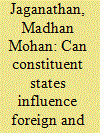

|
|
|
|
|
| Summary/Abstract |
The Indian state has undergone significant transformation since the late 1980s, most notably the extensive decentralisation of power, with consequences for the formation and implementation of Indian foreign policy. This article explores the role of India’s constituent states explaining the extent and limitations of their autonomy and influence. It deploys and extends the state transformation approach to incorporate considerations of issue area and coalition type. Under coalitions led by typical national parties, subnational governments are less likely to influence foreign and security policy. Under the same coalition type, they are more likely to behave autonomously on non-traditional security issues such as sharing of water resources with neighbouring countries. They are less likely to behave autonomously on security issues such as the transnational expression of ethnic solidarity. Under coalitions led by atypical national parties or regional parties, subnational governments are likely to exercise a moderate level of autonomy and influence on issue areas such as transnational expression of ethnic solidarity. They are likely to exercise a high level of autonomy and influence on non-traditional security issues such as sharing of water resources. The framework is illustrated through Tamil Nadu’s activism on Sri Lanka, and West Bengal’s position on water-sharing with Bangladesh.
|
|
|
|
|
|
|
|
|
|
|
|
|
|
|
|
| 3 |
ID:
167688
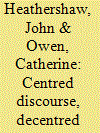

|
|
|
|
|
| Summary/Abstract |
This paper challenges dominant understandings of ‘rising powers’ by developing a decentred, relational account of Russia and China in Central Asia. We ask whether Moscow and Beijing’s regional integrative strategies do not guide, but rather are led by, everyday interactions among Russian and Chinese actors, and local actors in Central Asia. Rising powers, as a derivative of ‘Great Powers’, are frequently portrayed as structurally comparable units that concentrate power in their executives, fetishise territorial sovereignty, recruit client states, contest regional hegemony and explicitly oppose the post-1945 international order. In contrast, we demonstrate that the centred discourse of Eurasian integration promoted by Russian and Chinese leaders is decentred by networks of business and political elites, especially with regard to capital accumulation. Adopting Homi K. Bhabha’s notion of mimicry (subversion, hybridity) and J. C. Scott’s conception of mētis (local knowledge, agency), and using examples of Russian and Chinese investments and infrastructure projects in Central Asia, we argue that in order to understand centring discourse we must look to decentring practices at the periphery; that is, rising power is produced through ongoing interactions between actors at the margins of the state’s hegemonic reach.
|
|
|
|
|
|
|
|
|
|
|
|
|
|
|
|
| 4 |
ID:
167690


|
|
|
|
|
| Summary/Abstract |
This article seeks to challenge the conception of the Russian state as being centred on Vladimir Putin by looking at the actors implementing Russia’s foreign policy in its near abroad. In particular, it explores the activities of curators (kuratory), a term applied in Russia to describe officials tasked with making things work often bypassing, and sometimes competing with, formal institutions. Following the state transformation framework, the argument put forward in the article is that curation (kuratorstvo), as a practice of coordination and control in Russia’s system of governance, can be seen as a manifestation of fragmentation and internationalisation of Russia’s foreign policy making. The empirical basis for this article is a case study of Russia’s policy towards Abkhazia, which Russia officially recognised as a sovereign state in 2008. This article addresses the involvement of curators in their attempts to exert political influence as an expression of fragmentation as well as emerging institutionalised curation in development assistance as a part of internationalisation.
|
|
|
|
|
|
|
|
|
|
|
|
|
|
|
|
| 5 |
ID:
167693
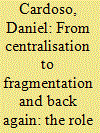

|
|
|
|
|
| Summary/Abstract |
Since the 1990s, Brazil’s foreign policy-making, traditionally a highly centralised and hierarchical process, has become more fragmented, plural and horizontal. In this context, the role of non-state actors has been increasingly relevant. The impact and significance of these actors have been however a matter of debate. While there are authors that consider that non-state actors play only a secondary role in the policy-making process, there are others that assert that these actors work alongside governmental actors and directly influence policy choices. Drawing on the concept of network governance, the paper proposes a different view from the two recurrent approaches in the literature mentioned above. It argues that the recent steps to transform Brazil’s state governance from hierarchy to horizontal networks have indeed expanded the room for the direct participation of non-state actors in the policy process. However, state authorities fought to adjust this tendency, in order to retain control over the decision-making process, by putting in place formal and informal coordinating mechanisms led by the Ministry of Foreign Relations and the Presidency. This suggests Brazil’s foreign policy was made in the shadow of hierarchy. The paper demonstrates the argument using the case of Brazil’s foreign policy towards China.
|
|
|
|
|
|
|
|
|
|
|
|
|
|
|
|
| 6 |
ID:
167691
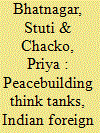

|
|
|
|
|
| Summary/Abstract |
Foreign policy making in India is typically viewed as highly centralised and dominated by the Prime Minister’s Office and bureaucracy. Yet in 2004, the Congress-Party-led United Progressive Alliance government launched a Composite Dialogue with Pakistan which included a place for Indian think tanks in the Kashmir dispute. We suggest that as India liberalised its economy amidst domestic political upheaval, think tanks were given greater access to domestic and foreign funding and adopted new roles in foreign policy making. In the case of the Kashmir conflict, peacebuilding think tanks were encouraged by the government to engage in cross-border activities that would build constituencies for peace with Pakistan and promote economic cooperation as an incentive for peace. While the government aimed to depoliticise the conflict, these think tanks used this opportunity to draw attention to marginalised perspectives and issues. Peacebuilding think tanks nonetheless faced significant challenges in shaping the peace process because of structural constraints regarding access to resources and lack of autonomy to further their agendas. This reflected resistance within the state to depoliticising a conflict that has long been India’s central national security issue.
|
|
|
|
|
|
|
|
|
|
|
|
|
|
|
|
| 7 |
ID:
167686
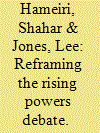

|
|
|
|
|
| Summary/Abstract |
The volume that we introduce breaks with the prevalent tendency in International Relations (IR) scholarship to treat rising powers (such as China, Russia, India and Brazil) as unitary actors in international politics. Although a neat demarcation of the domestic and international domains, on which the notion of unitary agency is premised, has always been a myth, these states’ uneven integration into the global political economy has eroded this perspective’s empirical purchase considerably. Instead, this collection advances the concept of ‘state transformation’ as a useful lens through which to examine rising power states’ foreign policymaking and implementation. State transformation refers to the pluralisation of cross-border state agency via contested and uneven processes of fragmentation, decentralisation and internationalisation of state apparatuses. The volume demonstrates the significance of state transformation processes for explaining some of these states’ most important foreign policy agendas, and outlines the implications for the wider field in IR.
|
|
|
|
|
|
|
|
|
|
|
|
|
|
|
|
| 8 |
ID:
167694
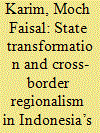

|
|
|
|
|
| Summary/Abstract |
This article examines how the decentralisation and fragmentation of the Indonesian state and resultant central–local dynamics affect cross-border regionalism in Indonesia’s periphery. It argues that cross-border regionalism projects are best understood as sites for scalar contestation over regulatory control between central and local government. Moreover, scalar contestation around cross-border regional projects is characterised by the struggles to control relationships with transnational capital between elites operating at different tiers of the state. When elites at different scales have conflicting interests and strategies, this can cause policy incoherence, inhibiting the development of cross-border regionalism. Conversely, when they align, and intersect with the interests of transnational business, cross-border regionalism can succeed. To illustrate the argument, this article utilises the comparative case studies of the Batam free trade zone and West Kalimantan–Sarawak cross-border cooperation.
|
|
|
|
|
|
|
|
|
|
|
|
|
|
|
|
| 9 |
ID:
167689
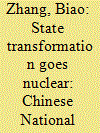

|
|
|
|
|
| Summary/Abstract |
Most of the literature on state transformation focuses on China’s relations with African, Asian and Latin American countries and the National Oil Companies’ overseas expansion to show that China has become fragmented, decentralised and internationalised. This article contributes novel findings by focusing on China’s relations with Europe and the actions of China’s National Nuclear Companies (NNCs). It shows that NNCs, which have become relatively autonomous actors, often pursue their agendas of expansion into Europe without much coordination with, or even in contradiction to, other ministries’ agendas and interests, especially the Ministry of Foreign Affairs. Instead of being orchestrated by the central government, their expansion reflects considerable disorganisation and sometimes undermines China’s official strategy. The article demonstrates this through case studies of NNCs’ involvement in the UK and Romania.
|
|
|
|
|
|
|
|
|
|
|
|
|
|
|
|
| 10 |
ID:
167687
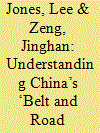

|
|
|
|
|
| Summary/Abstract |
China’s massive ‘Belt and Road Initiative’ (BRI) – designed to build infrastructure and coordinate policymaking across Eurasia and eastern Africa – is widely seen as a clearly-defined, top-down ‘grand strategy’, reflecting Beijing’s growing ambition to reshape, or even dominate, regional and international order. This article argues that this view is mistaken. Foregrounding transformations in the Chinese party-state that shape China’s foreign policy-making, it shows that, rather than being a coherent, geopolitically-driven grand strategy, BRI is an extremely loose, indeterminate scheme, driven primarily by competing domestic interests, particularly state capitalist interests, whose struggle for power and resources are already shaping BRI’s design and implementation. This will generate outcomes that often diverge from top leaders’ intentions and may even undermine key foreign policy goals.
|
|
|
|
|
|
|
|
|
|
|
|
|
|
|
|
|
|
|
|
|